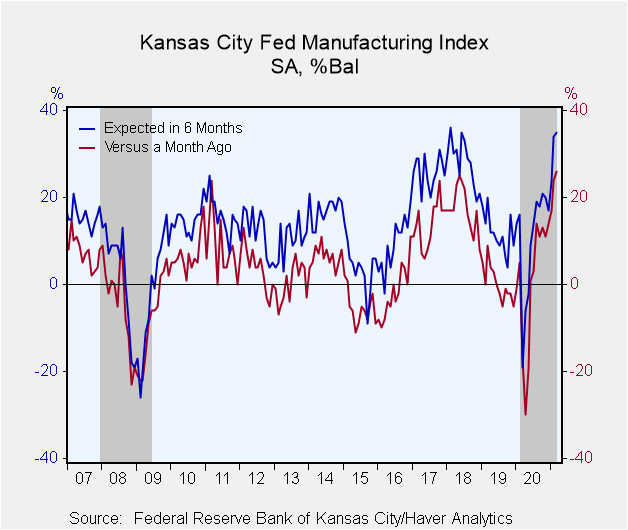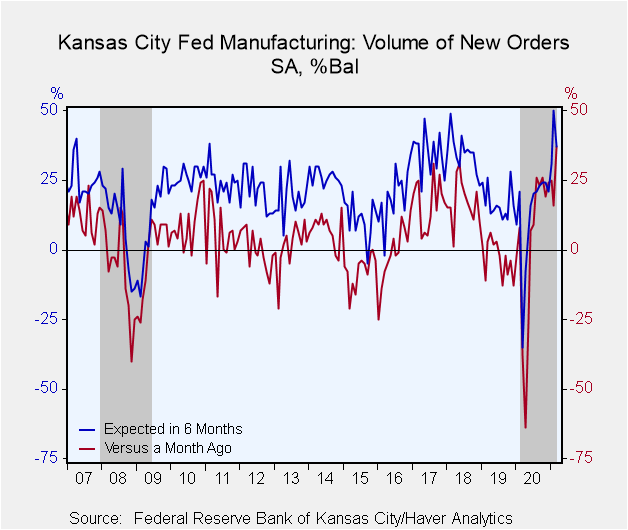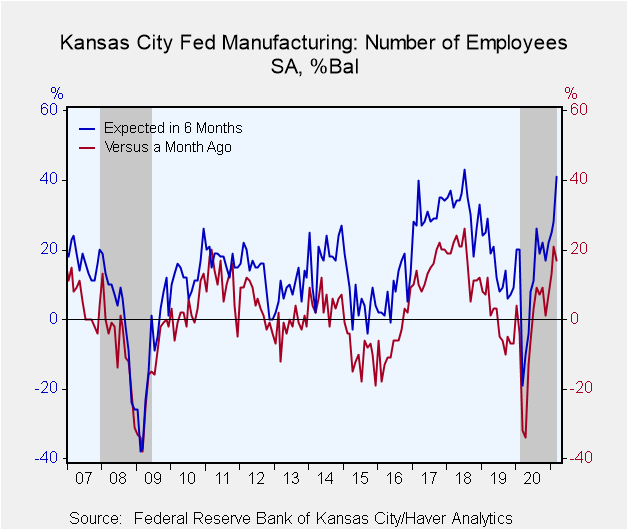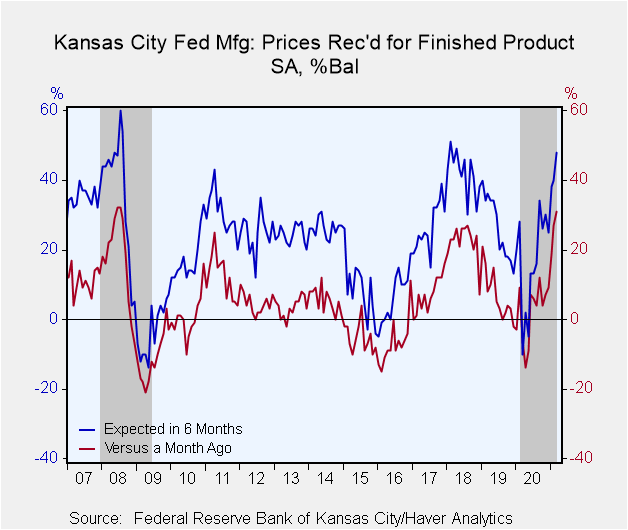 Global| Mar 25 2021
Global| Mar 25 2021Kansas City Fed Manufacturing Index Improves Again in March
by:Tom Moeller
|in:Economy in Brief
Summary
• Growth continues at a record level. • Component movement is mixed. • Expectations for six months ahead improve. The Federal Reserve Bank of Kansas City reported that its manufacturing sector business activity index rose to a record [...]
• Growth continues at a record level.
• Component movement is mixed.
• Expectations for six months ahead improve.
The Federal Reserve Bank of Kansas City reported that its manufacturing sector business activity index rose to a record 26 in March from 24 in February. The headline figure compares to -17 one year ago. The series dates back to July 2001.
The ISM-Adjusted Index (NSA) rose to 65.4 in March from 60.6 in February. It too was a record, remaining well above the level of 50 which separates expansion from contraction.
Movement amongst the individual series was mixed. The supplier delivery time index held steady after surging to a record 40 in February, indicating sharply slower product delivery speeds. The new orders index also surged to a near-record 37 from 16 in February. The shipments index recaptured most of its February decline. The order backlog measure surged to a new high. To the downside, the employment series eased to 17 from 21 in February which was the highest level since July 2018. The production series declined to 23 from 26, also the highest level since July 2018.
On the inflation front, the prices received index for finished products strengthened to a near-record 31. It compared to the deflationary readings registered earlier last year. The raw materials index eased to 66 from 68. It remained up from -16 in April of 2020.
The expectations-in-six months composite reading edged higher to 35 in March, up sharply from -19 in March of last year. Expected new orders and shipments fell but employment and production improved.
Expectations for prices received rose to a near-record 48. Expectations for raw materials prices also surged to 72 this month, the highest level since March 2011.
The figures date back to July 2001. The composite index is an average of the production, new orders, employment, supplier delivery time and raw materials inventory indexes. The diffusion indexes are calculated as the percentage of total respondents reporting increases minus the percentage reporting declines. The November survey was conducted during the six-day period from November 10-16, 2020 and included 109 responses from plants in Colorado, Kansas, Nebraska, Oklahoma, Wyoming, northern New Mexico and western Missouri. Data for the Kansas City Fed Survey can be found in Haver's SURVEYS database.
| Kansas City Federal Reserve Manufacturing Survey (SA) | Mar | Feb | Jan | Mar'20 | 2020 | 2019 | 2018 |
|---|---|---|---|---|---|---|---|
| Conditions Versus One Month Ago (% Balance) | 26 | 24 | 17 | -17 | 0 | 0 | 17 |
| ISM-Adjusted Composite Index (NSA) | 65.4 | 60.6 | 58.1 | 43.1 | 50.1 | 50.0 | 58.9 |
| New Orders Volume | 37 | 16 | 25 | -38 | 1 | -3 | 17 |
| Number of Employees | 17 | 21 | 13 | -32 | -4 | -1 | 17 |
| Production | 23 | 26 | 22 | -18 | 0 | 2 | 19 |
| Prices Received for Finished Product | 31 | 27 | 19 | -6 | 2 | 7 | 22 |
| Expected Conditions in Six Months | 35 | 34 | 24 | -19 | 10 | 12 | 28 |
| New Orders Volume | 37 | 50 | 31 | -35 | 12 | 17 | 35 |
| Number of Employees | 41 | 28 | 25 | -19 | 11 | 15 | 33 |
| Production | 45 | 44 | 46 | -36 | 14 | 19 | 40 |
| Prices Received for Finished Product | 48 | 40 | 38 | -10 | 16 | 26 | 42 |
Tom Moeller
AuthorMore in Author Profile »Prior to joining Haver Analytics in 2000, Mr. Moeller worked as the Economist at Chancellor Capital Management from 1985 to 1999. There, he developed comprehensive economic forecasts and interpreted economic data for equity and fixed income portfolio managers. Also at Chancellor, Mr. Moeller worked as an equity analyst and was responsible for researching and rating companies in the economically sensitive automobile and housing industries for investment in Chancellor’s equity portfolio. Prior to joining Chancellor, Mr. Moeller was an Economist at Citibank from 1979 to 1984. He also analyzed pricing behavior in the metals industry for the Council on Wage and Price Stability in Washington, D.C. In 1999, Mr. Moeller received the award for most accurate forecast from the Forecasters' Club of New York. From 1990 to 1992 he was President of the New York Association for Business Economists. Mr. Moeller earned an M.B.A. in Finance from Fordham University, where he graduated in 1987. He holds a Bachelor of Arts in Economics from George Washington University.










